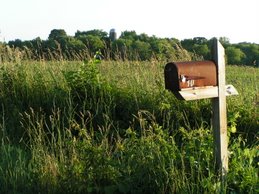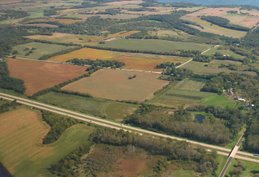Hooray for Richard Bloomquist! Here is an alder who isn’t afraid to take a stand for what he knows is right, even when he clearly sees that he’s going to lose the vote. If more alders start to express their true feelings and vote their consciences, all sorts of “politically unfeasible” things may start happening!
At the Oct. 9 Fitchburg Common Council meeting, the alders had to decide whether to accept the Plan Commission’s map for a long term Urban Growth Boundary, which includes 3378 additional acres for development, including all of the Northeast Neighborhood.
Not only did Alder Bloomquist speak out against a plan that may endanger our water table, he also had the political courage to point out that though he and the mayor both opposed it, they had very different reasons for doing so.
(We are currently working on getting a short video on You Tube, and will post the link when we succeed.)
He also deserves our thanks for defending the democratic process. He reacted with incredulity to the news that some Plan Commissioners want to severely limit the public’s participation in the planning process.
“Why’d they shut the springs off?”
As the Council took up the question of whether to adopt the Urban Growth Boundary (UGB) map that the Plan Commission (PC) had crafted, Alder Bloomquist surprised many by announcing that he would vote no.
“In the last 60 or 45 days, I’ve had some concerns with what we’re about to do to the city…I have some concerns with water. I have concerns with water recharge of the aquifers underneath us. I have concerns with what we may or may not do with ag ground, that is now inside some of this shaded border. We’ve been told that if we don’t move the borders at all, we have quite a bit of ground at the current rate of development, to last us for several years into the future.
“We’re about to, under the budget, possibly, take up Transfer of Development Rights and Purchase of Development Rights, probably more seriously than anyone thought we might a year ago. And I’m just a little gun shy about putting the kind of land out there, and drawing some maps and have some speculators decide this is what we’re gonna possibly do. One of the resolutions that we have this evening is the McGaw North Neighborhood, with the 5 developers that signed that.
“I just don’t feel comfortable until I hear more about Transfer of Development Rights and Purchase of Development Rights, and keeping certain farm grounds from ever being developed. But mostly I don’t want my name on anything that a generation from now people will say, ‘Why’d they shut the springs off, why’d they do this with the water?’ I just don’t have a comfort level tonight to say I want to see the current Urban Service Area get any bigger, nor the possibility of it getting any bigger. So that is my reason for voting no this evening.”
Alder Steve Arnold replied, “The concerns that you cited, are for me the reasons to support an urban growth boundary.” And he asked Bloomquist to elaborate.
Alder Bloomquist responded,
“…Someone asked me earlier today, if I would be in favor of freezing the current urban service area and not growing and developing any more. And I have a comfort level that would say at the moment, yeah, I’d support that. I’d make the current urban service area, the permanent boundary of the city. But that’s probably not realistic 30 or 40 years down the road, as we grow out. But I’d just really like to know where we’re going with Transfer of Development rights, and Purchase of Development Rights, cause I think there’s been some, almost faith that that’s going to happen, and take the pressure off some the development that’s inside those lines [of the Urban Growth Boundary].A little later, when Alder Arnold asked him if it eased his mind at all to hear that the Plan Commission intends to have a framework for a TDR [Transfer of Development Rights] program by January, Alder Bloomquist laughed and responded, “You should probably quit selling and vote, cause it’s gonna be 7 to 1 anyway.”When it was the mayor’s turn to speak he said,
… I have this feeling that if we don’t do this right, we’re gonna screw up the water table, and I think that’s too big of a risk to take. And I’d really like to know more about the water, and the development rights. And if we’re gonna take farm ground that encroaches into some of these areas, and say, even though it’s in the possible Future Urban Development Area, that we’re not gonna do it.
And the more I think about it, is 75 acres the right number? That’s still a lot of ground per year to take out for homes…But it’s just those 2 big things. I don’t want to see the water table screwed up, and I want to know what were gonna do with some of the farm ground.”
“I think this is a real important vote tonight… A lot of the things Richard said, I won’t repeat, cause not only do I think he talked from his heart, he talked from the way I want to talk, of real concern. If you look at the map, on the west side, it’s not balanced…”
Alder Bloomquist later responded,
“Excuse me, Mr. Mayor… I think you and I disagree… on what we consider the shortcomings of the plan. I really don’t care if it’s skewed to one side or the other. …I’m really not anti-development this evening, but I’m not really pro-development to concrete anymore. I’m not really pro-subsistence farming either… I think the taxpayers of Fitchburg will pay for TDR or PDR and keep soils that should be in ag, in ag. I think if it’s explained the right way, that’ll happen. … [Alder] Steve [Arnold] sort of chided on me on have a little bit of faith of keeping farm grounds out. After 57 years, faith is a little thin… so I’ll take some of it at their word, but I’m still going to vote no tonight, but probably not for the reasons the mayor thinks.”
He was right, he lost that vote 7 to 1, but he gained the respect and gratitude of many citizens. We were also glad to hear his incredulous question to Alder Jay Allen: “I’ve been reading the minutes of some of the Plan Commission things. You aren’t really talking about shutting off public participation in the plan process, and not allowing people to speak, are you?”
Alder Allen started to respond with “What…” and Alder Bloomquist interrupted with “No, that was a yes-or-no question.” (For more info on the topic of public participation, see the blog entry Keep "Public" in Public Hearings, and watch the You Tube video of the 10-9-07 Common Council meeting when we post the link in a few days.)
I hope that other alders will take courage from Alder Bloomquist’s willingness to absorb new information, come to uncomfortable conclusions, and then speak out.


